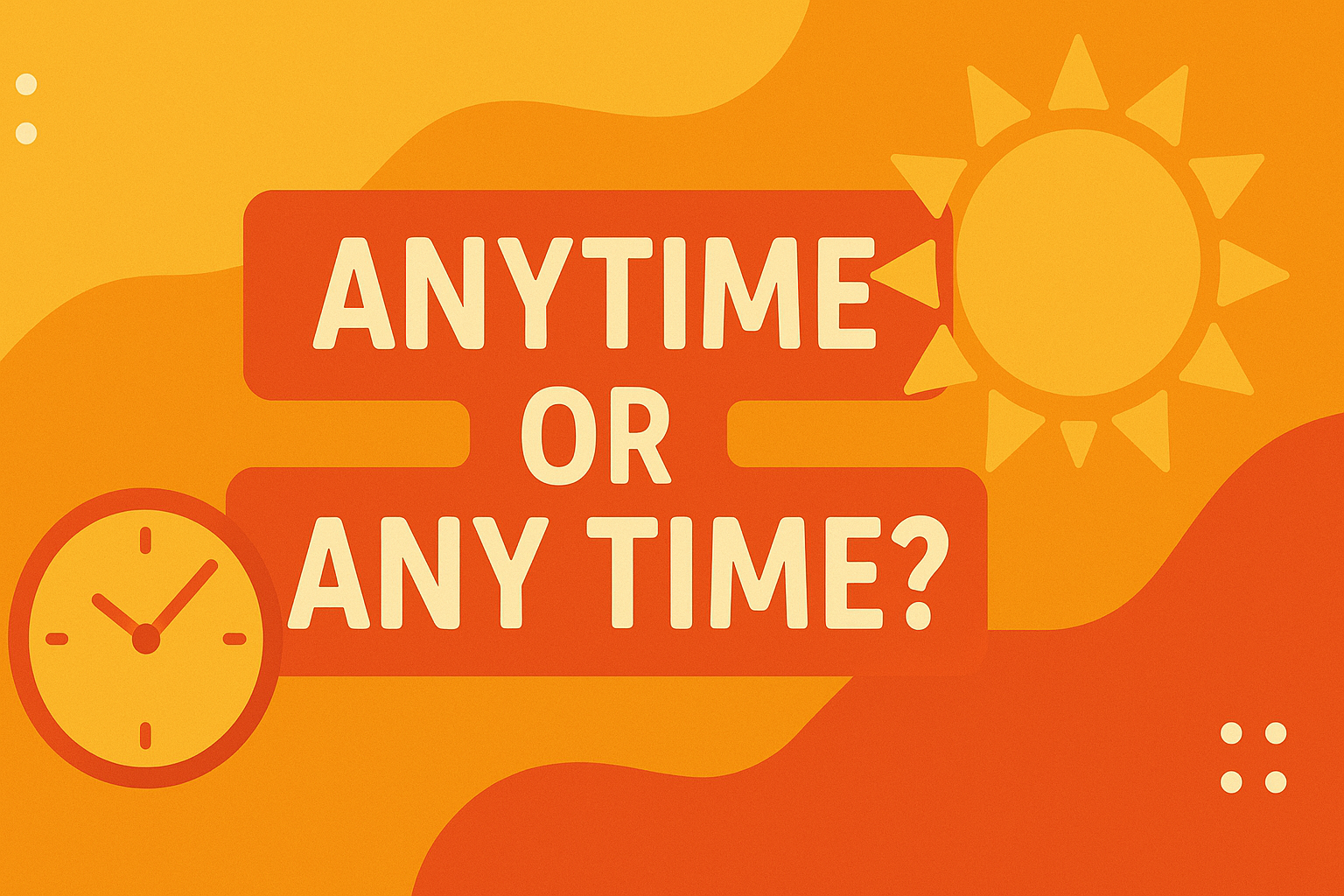Anytime vs Any time is one of the most frequent questions for English learners, writers, and even native speakers who want to communicate clearly. Although these phrases sound identical, their meaning and usage can differ subtly but importantly. Misusing them can change the tone of your writing, make your sentences sound awkward, or convey the wrong idea. Understanding the difference is key for both formal writing and everyday communication. In this guide, we will explain the nuances of anytime and any time, provide examples, and offer practical tips for usage, as noted by the editors of Baltimore Chronicle. Mastering these small details will make your English sound more natural and polished.
Understanding “Anytime”
Before exploring the differences, it’s essential to understand anytime. This is a single word, functioning as an adverb, and it generally means “at any point in time” without specifying a duration. It is flexible, often appearing in informal writing or speech, and emphasizes general availability rather than precise timing.
It’s important to note that anytime conveys openness, willingness, or an unspecified moment. It is often used to show friendliness or convenience in casual situations.
Examples of anytime in sentences:
- You can call me anytime you want.
- She’s welcome to join anytime during the week.
- I’m happy to help anytime.
- He said he would be available anytime next week.
- Feel free to stop by anytime; there’s no need to make an appointment.
Using anytime correctly creates a tone that is warm and approachable. It works well in emails to colleagues in informal settings, personal messages, and casual conversations. Remember, this form is generally less formal, so it’s not always suitable for academic or business writing.
Understanding “Any time”
Any time, in contrast, is two separate words. This is a noun phrase and often refers to a measurable amount or period of time, rather than a vague point. It is more formal and precise, commonly used in structured writing, business emails, and academic contexts.
It can be challenging to distinguish at first because anytime and any time sound the same when spoken. However, paying attention to whether the sentence emphasizes an amount of time or a general moment will guide your choice.
| Phrase | Part of Speech | Usage | Example |
|---|---|---|---|
| Any time | Noun phrase | Formal, measurable | I don’t have any time to waste this afternoon. |
| Any time | After preposition | Formal | Do you have any time this evening to meet? |
| Any time | Specific duration | Formal | She spent any time she could on her studies. |
As the table shows, any time emphasizes quantity, duration, or opportunity. It works best in sentences that refer to deadlines, appointments, schedules, or measurable periods. Unlike anytime, it fits perfectly in formal writing and professional communication, providing clarity and precision.
Quick Tips to Distinguish Anytime vs Any time
Many English learners mix these two forms because they sound identical. Here are practical tips to make your writing more precise and avoid mistakes.
- If the phrase answers “when?” in a general, informal way, use anytime.
- If it refers to an amount of time or comes after a preposition, use any time.
- Replace the phrase with “at any time” in your sentence: if it still makes sense, anytime is correct.
- Remember that any time is usually more formal and precise, suitable for business or academic contexts.
- Always consider the tone of your writing: casual or conversational → anytime; formal or structured → any time.
Examples:
- You can visit me anytime. → informal, okay for friends or family
- Do you have any time to discuss this project? → specific, measurable period
- I’ll help you anytime you need. → casual, conversational
- She didn’t spend any time worrying about it. → measurable duration
Keeping these rules in mind ensures that your sentences communicate exactly what you intend. Misusing these forms may confuse readers or create a slightly awkward tone.
Common Mistakes and How to Avoid Them
Even experienced writers sometimes confuse anytime and any time, leading to subtle errors that affect clarity. Understanding the most frequent mistakes can improve your writing immediately.
- ❌ Incorrect: I don’t have anytime to waste. → should be any time
- ❌ Incorrect: Call me at any time you want. → better in informal context: anytime
- ✅ Correct: I’m available at any time tomorrow. → formal, precise
- ✅ Correct: You can reach me anytime during the week. → informal, friendly
- ❌ Incorrect: She didn’t spend anytime preparing. → correct: any time
- ✅ Correct: She can come over anytime she likes. → casual, informal
Paying attention to context and sentence structure will help you avoid these mistakes. Over time, choosing the correct form will become intuitive.
Summary Table for Reference
To make it even easier, here is a summary that shows the main differences at a glance. Refer to this table whenever you are unsure which form to use.
| Phrase | Part of Speech | Tone/Context | Example |
|---|---|---|---|
| Anytime | Adverb | Informal, general | Call me anytime. |
| Any time | Noun phrase | Formal, measurable | Do you have any time to meet? |
This concise reference helps writers instantly determine which form fits best in context. Whether composing emails, essays, or casual messages, this guide ensures clarity and correctness.
Earlier we wrote about Goodbye or Good Bye? – correct spelling and when to use each.

